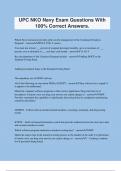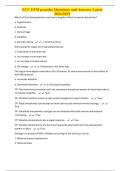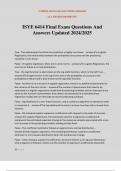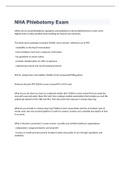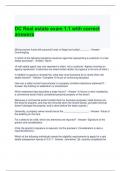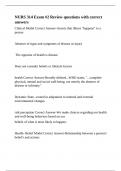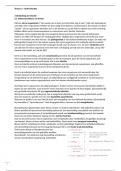Moral Realism 5 Markers
1. Explain naturalism with reference to utilitarianism and virtue ethics (5)
2. Explain intuitionism as a form of moral non-naturalism (5)
3. Explain Moore’s ‘open question argument’ against all reductive metaethical theories (5)
4. Explain the Naturalistic Fallacy as a criticism of naturalism (5)
5. Explain Hume’s Fork as a criticism of moral realism (5)
6. Explain AJ Ayer’s verification principle as a criticism of moral realism (5)
7. Hume's argument that moral judgements are not beliefs since beliefs alone could not motivate us
(5)
8. Explain Hume's is-ought gap (5)
9. Explain John Mackie's argument from relativity (5)
10. Explain John Mackie's arguments from queerness (5)
1. Moral Naturalism falls within the wider scope of Moral Realism. It not only claims
that objective moral properties exist independently of the mind, but they are
considered to be wholly natural and relating to the world. Naturalism can be
divided into reductive and non-reductive. Bentham’s Utilitarianism involves the
reduction of goodness. Goodness is happiness, understood as pleasure. This is
an illustration of a moral property being identical with a property of the world,
identified empirically. Non-reductive naturalism differs since it claims moral
properties are themselves natural and hence are irreducible to other natural
properties. Aristotle’s Virtue Ethics exemplifies this with concepts such as
‘eudaimonia’. The good, in this case, is not only eudaimonia, but eudaimonia is
itself an irreducible moral property.
2. Non-naturalism is the realist claim that there are moral properties which are
unique to the types of properties we experience through our senses. In other
words, they are non-natural properties. Moore’s theory is that instead of
understanding moral truths from empirical evidence and inference, we grasp
them intuitively, hence his theory is known as intuitionism. He claims moral facts
are self-evident. For example, the proposition ‘killing is wrong’, does not have to
be discovered through experience- we simply grasp this fact as true. This theory
leads to a clear cognitivist account of how ethical language can be meaningful,
whilst maintaining the ‘autonomy of ethics’- we can have unique judgements,
sparking debate, whilst objective moral facts exist. This is made possible since
different people’s intuitive abilities vary.
3. Reductive naturalism is a branch of moral realism that claims moral properties
exist and are identical (reducible) to properties that can be identified in the world
through sense experience. Moore’s open question argument is his opposition to
naturalism. It goes that closed questions are true by definition (analytically true),
having only one answer. Open questions however, can conceivably have multiple
answers. If naturalism were true, then to ask ‘is pleasure the good?’, would be a
1. Explain naturalism with reference to utilitarianism and virtue ethics (5)
2. Explain intuitionism as a form of moral non-naturalism (5)
3. Explain Moore’s ‘open question argument’ against all reductive metaethical theories (5)
4. Explain the Naturalistic Fallacy as a criticism of naturalism (5)
5. Explain Hume’s Fork as a criticism of moral realism (5)
6. Explain AJ Ayer’s verification principle as a criticism of moral realism (5)
7. Hume's argument that moral judgements are not beliefs since beliefs alone could not motivate us
(5)
8. Explain Hume's is-ought gap (5)
9. Explain John Mackie's argument from relativity (5)
10. Explain John Mackie's arguments from queerness (5)
1. Moral Naturalism falls within the wider scope of Moral Realism. It not only claims
that objective moral properties exist independently of the mind, but they are
considered to be wholly natural and relating to the world. Naturalism can be
divided into reductive and non-reductive. Bentham’s Utilitarianism involves the
reduction of goodness. Goodness is happiness, understood as pleasure. This is
an illustration of a moral property being identical with a property of the world,
identified empirically. Non-reductive naturalism differs since it claims moral
properties are themselves natural and hence are irreducible to other natural
properties. Aristotle’s Virtue Ethics exemplifies this with concepts such as
‘eudaimonia’. The good, in this case, is not only eudaimonia, but eudaimonia is
itself an irreducible moral property.
2. Non-naturalism is the realist claim that there are moral properties which are
unique to the types of properties we experience through our senses. In other
words, they are non-natural properties. Moore’s theory is that instead of
understanding moral truths from empirical evidence and inference, we grasp
them intuitively, hence his theory is known as intuitionism. He claims moral facts
are self-evident. For example, the proposition ‘killing is wrong’, does not have to
be discovered through experience- we simply grasp this fact as true. This theory
leads to a clear cognitivist account of how ethical language can be meaningful,
whilst maintaining the ‘autonomy of ethics’- we can have unique judgements,
sparking debate, whilst objective moral facts exist. This is made possible since
different people’s intuitive abilities vary.
3. Reductive naturalism is a branch of moral realism that claims moral properties
exist and are identical (reducible) to properties that can be identified in the world
through sense experience. Moore’s open question argument is his opposition to
naturalism. It goes that closed questions are true by definition (analytically true),
having only one answer. Open questions however, can conceivably have multiple
answers. If naturalism were true, then to ask ‘is pleasure the good?’, would be a

